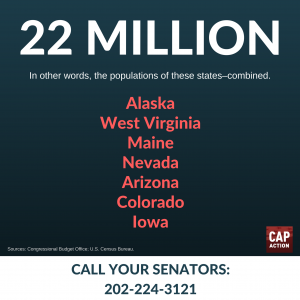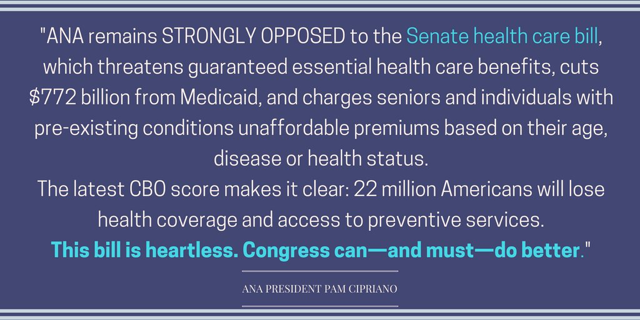Today, Senate Republicans revealed their answer to health care reform by introducing legislation entitled the Better Care Reconciliation Act of 2017 (BCRA). This is the Senate’s response to the House passed American Health Care Act (AHCA). The 142 page proposal, drafted by 13 Republican Senators under a veil of secrecy, would dismantle the Affordable Care Act and result in a loss of health care coverage for millions of Americans. Republicans and Democrats have already expressed opposition to the bill.
Sens. Rand Paul (R-KY), Ted Cruz(R-TX), Ron Johnson(R-WI), and Mike Lee (R-UT) said in a joint statement that they are “not ready” to vote for the GOP health-care bill, but are open to negotiations. Former President Barack Obama also weighed in, calling the bill a “massive transfer of wealth from middle-class and poor families to the richest people in America.” President Trump promised a healthcare bill with “heart” calling the House bill “mean.”
At a press event held with Sens. Debbie Stabenow(D-MI), Maggie Hassan (D-NH) and Jeff Merkley(D-OR) American Nurses Association(ANA) President Pam Cipriano, PhD, RN, NEA-BC, FAAN stated ”The Senate’s health care proposal would be disastrous for our nation’s most vulnerable. We will not be fooled. This is not a promise kept. This is a promise broken. This proposal is heartless. We are nurses and we are worried about our patients. We will not stop fighting for them. We can—and must—do better.”
The response from providers, consumers, and industry was swift. While the Senate made changes to woo moderate Republicans within the caucus, they amounted to little more than window dressing.
Under the bill:
• Tens of millions of Americans would lose health insurance coverage, while millions more would see their premiums and out-of-pocket costs rise.
• Access to affordable coverage on the individual market would be further compromised with cuts to subsidies and a lower qualifying threshold for eligibility (Individuals at 400% of poverty eligible for subsidies under ACA, Senate bill lowers to 350%)
• Medicaid expansion would be rolled back over a 3 year phase-out period for expansion states between 2020-2023.
• The Medicaid program would be fundamentally restructured to a per-capita or block grant funding structure – shifting costs to already overburden state budgets.
• The Medicaid inflation rate would tied to the Consumer Price Index after 2025, an even lower growth rate than the House-passed bill.
• States could waive Essential Health Benefits, putting a critical set of health coverage protections at risk
• Waivers would allow states to undermine protection against discrimination for those with pre-existing conditions.
• And more than 2.4 million women getting care at Planned Parenthood clinics across the country would see their access to services disrupted. The bill defunds Planned Parenthood for a year.
For a more detailed summary and a side-by-side comparison of the Senate and House bills read our Health Policy one pager. As the Senate prepares to vote on this legislation next week, ANA will continue to fight for a better solution for health care, one that matches ANA’s core principles for health system transformation.
Lastly, it’s more important than ever for the Senate to hear from nurses. We’ve made it easy for you to call now! If we don’t make the phones ring off the hook, this bill will become law. And your patients will pay the price.



